2.1 — Game Theory & Property
ECON 315 • Economics of the Law • Spring 2021
Ryan Safner
Assistant Professor of Economics
safner@hood.edu
ryansafner/lawS21
lawS21.classes.ryansafner.com
Review of Static Game Theory
Game Theory

- Game theory: a set of tools that model trategic interactions (“games”) between rational agents, 3 elements:
- Players
- Strategies that each player can choose from
- Payoffs to each player that are jointly-determined from combination of all players’ strategies
Game Theory vs. Decision Theory Models I

Traditional economic models are often called “Decision theory”:
Optimization models ignore all other agents and just focus on how can you maximize your objective within your constraints
- Consumers max utility; firms max profit, etc.
Outcome: optimum: decision where you have no better alternatives
Game Theory vs. Decision Theory Models I

Traditional economic models are often called “Decision theory”:
Equilibrium models assume that there are so many agents that no agent’s decision can affect the outcome
- Firms are price-takers or the only buyer or seller
- Ignores all other agents’ decisions!
Outcome: equilibrium: where nobody has no better alternatives
Game Theory vs. Decision Theory Models III

Game theory models directly confront strategic interactions between players
- How each player would optimally respond to a strategy chosen by other player(s)
- Lead to a stable outcome where everyone has considered and chosen mutual best responses
Nash equilibrium: set of strategy profiles where nobody wants to switch strategies given the strategies everyone else is playing
- each player is playing a best response against other players’ strategies
As a Prisoner's Dilemma I

Suppose we have a simple duopoly between Apple and Google
Each is planning to launch a new tablet, and choose to sell it at a High Price or a Low Price
As a Prisoner's Dilemma I
- Payoff matrix represents profits to each firm
- First number in each box goes to Row player (Apple)
- Second number in each box goes to Column player (Google)

As a Prisoner's Dilemma II
- From Apple's perspective:
- Low Price is a dominant strategy for Apple

As a Prisoner's Dilemma II
- From Google's perspective:
- Low Price is a dominant strategy for Google

As a Prisoner's Dilemma II
- Nash equilibrium: (Low Price, Low Price)
- neither player has an incentive to change price, given the other's price

As a Prisoner's Dilemma III
Nash equilibrium: (Low Price, Low Price)
- neither player has an incentive to change price, given the other's price
A possible Pareto improvement: (High Price, High Price)
- Both players are better off, nobody worse off!
- Is it a Nash Equilibrium?

As a Prisoner's Dilemma IV
Google and Apple could collude with one another and agree to both raise prices
Cartel: group of sellers coordinate to raise prices to act like a collective monopoly and split the profits

Game Theory: Some Generalizations

There's a lot more to game theory than a one-shot prisoners' dilemma:
one shot vs. repeated game
discrete vs. continuous strategies
perfect vs. incomplete vs. and asymmetric information
simultaneous vs. sequential game
See my game theory course for more (likely taught next in Fall 2021)
Solution Concepts

We use "solution concepts" to allow us to predict an equilibrium of a game
Nash Equilibrium is the primarly solution concept
- Note it has many variants depending on if games are sequential vs. simultaneous, perfect vs. imperfect information, etc.
Solution Concepts: Nash Equilibrium

- Recall, Nash Equilibrium: no players want to change their strategy given what everyone else is playing
- All players are playing a best response to each other
Solution Concepts: Nash Equilibrium

- Important about Nash equilibrium:
N.E. ≠ the "best" or optimal outcome
- Recall the Prisoners' Dilemma!
Game may have multiple N.E.
Game may have no N.E. (in "pure" strategies)
Example: Coordination Game

- A Coordination Game
- No dominant strategies
Example: Coordination Game

- Two Nash equilibria: (A,A) and (B,B)
- Either just as good
- Coordination is most important
Example: Coordination Game

- Two general methods to solve for Nash equilibria:
1) Cell-by-Cell Inspection: look in each cell, does either player want to deviate?
- If no: a Nash equilibrium
- If yes: not a Nash equilibrium
Example: Coordination Game

- Two general methods to solve for Nash equilibria:
2) Best-Response Analysis: take the perspective of each player. If the other player plays a particular strategy, what is your strategy(s) that gets you the highest payoff?
- Ties are allowed
- Any cell where both players are playing a best response is a Nash Equilibrium
Example: Coordination Game

Player 1's best responses
- Two general methods to solve for Nash equilibria:
2) Best-Response Analysis: take the perspective of each player. If the other player plays a particular strategy, what is your strategy(s) that gets you the highest payoff?
- Ties are allowed
- Any cell where both players are playing a best response is a Nash Equilibrium
Example: Coordination Game

Player 2's best responses
- Two general methods to solve for Nash equilibria:
2) Best-Response Analysis: take the perspective of each player. If the other player plays a particular strategy, what is your strategy(s) that gets you the highest payoff?
- Ties are allowed
- Any cell where both players are playing a best response is a Nash Equilibrium
Example: Coordination Game

N.E.: each player is playing a best response
- Two general methods to solve for Nash equilibria:
2) Best-Response Analysis: take the perspective of each player. If the other player plays a particular strategy, what is your strategy(s) that gets you the highest payoff?
- Ties are allowed
- Any cell where both players are playing a best response is a Nash Equilibrium
A Change in the Game

Two Nash equilibria again: (A,A) and (B,B)
But here (A,A) ≻ (B,B)!
A Change in the Game

Path Dependence: early choices may affect later ability to choose or switch
Lock-in: the switching cost of moving from one equilibrium to another becomes prohibitive
Suppose we are currently in equilibrium (B,B)
Inefficient lock-in:
- Standard A is superior to B
- But too costly to switch from B to A
Some Games Have No Nash Equilibrium
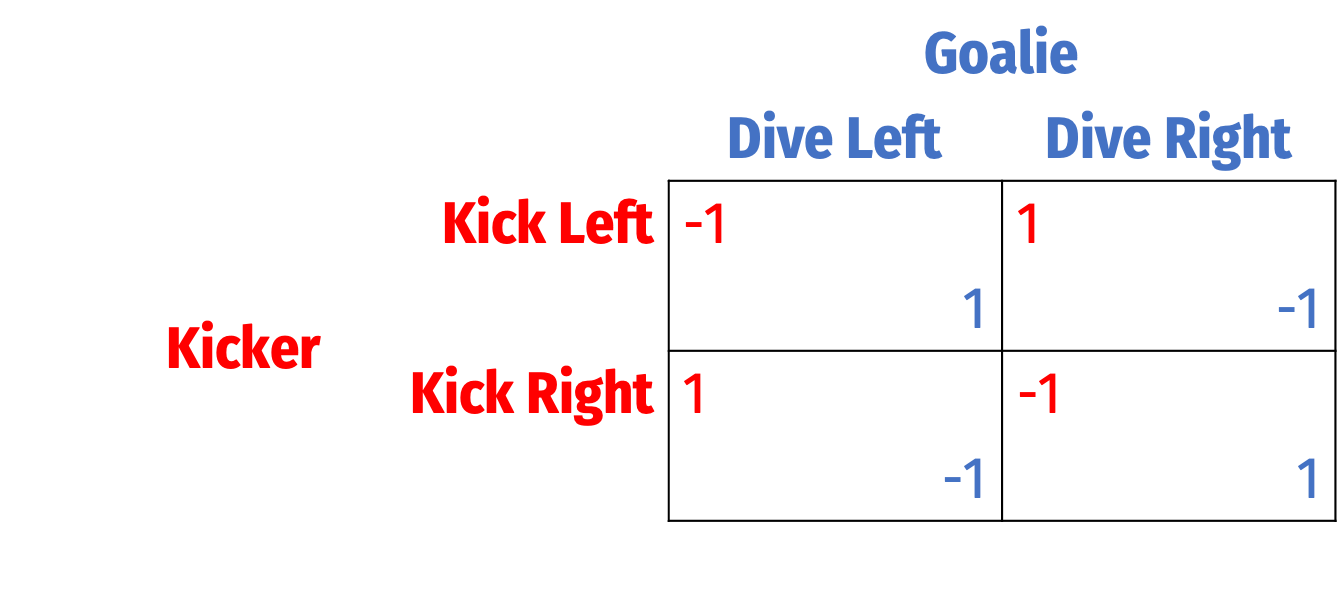
Some Games Have No Nash Equilibrium
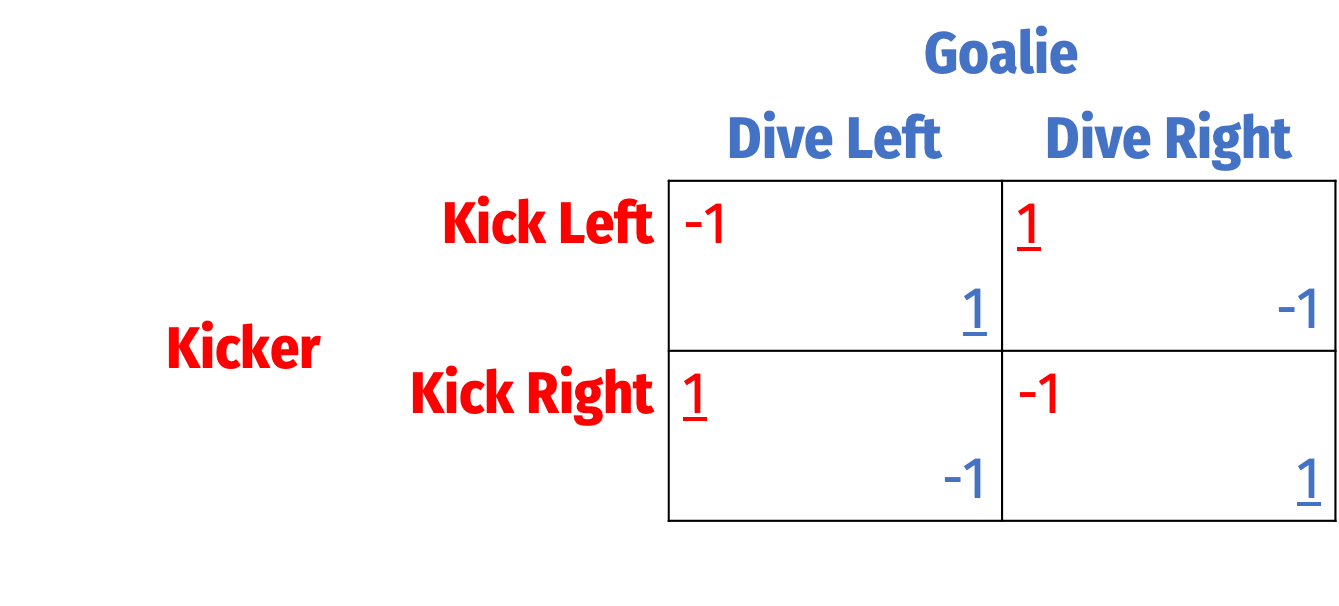
Best responses
No strategy profile where both players are playing a best responses
No Nash Equilibrium in “pure strategies”
But there is (always) a Nash Equilibrium in “mixed strategies”
The Problem, Philosophically, and Game-Theoretically
Why Do We Need Property Law?
A solution to the tragedy of the commons
Imagine two neighboring farmers
- game theoretic interaction
- each farmer can either Farm or Steal

Why Do We Need Property Law?
- Suppose:
- crops are valued at 15
- planting & watering costs 5
- stealing costs 3

Why Do We Need Property Law?
Suppose:
- crops are valued at 15
- planting & watering costs 5
- stealing costs 3
With no legal system, the game looks like:
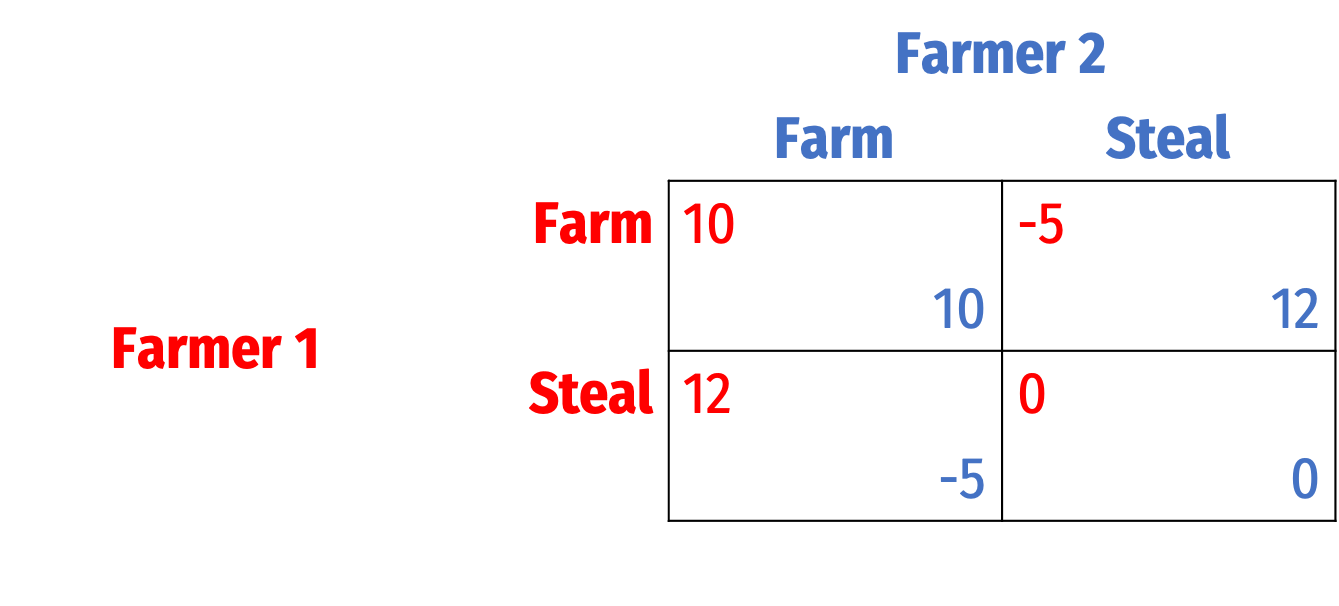
Why Do We Need Property Law?
- Nash Equilibrium: (Steal,Steal)
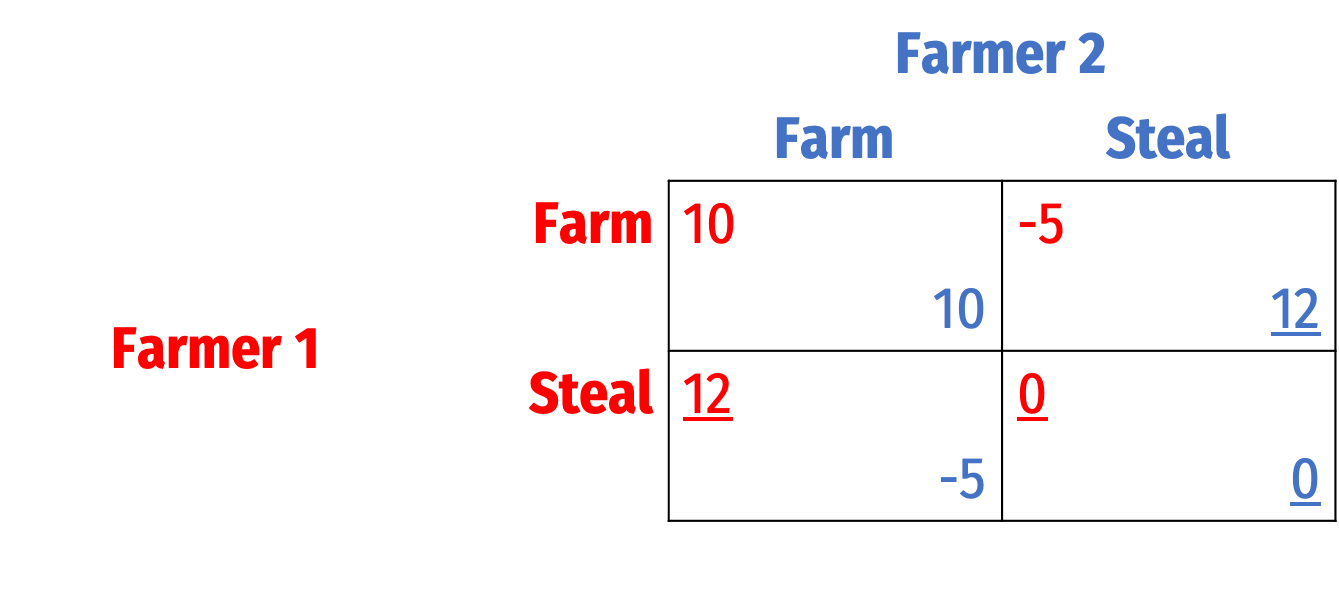
The Hobbesian Dilemma

Thomas Hobbes
1588-1679
"In [the state of nature], there is no place for Industry; because the fruit thereof is uncertain; and consequently no Culture of the Earth...no Knowledge of the face of the Earth; no account of Time; no Arts; no Letters; no Society; and which is worst of all, continuall feare, and danger of violent death; And the life of man, solitary, poore, nasty, brutish, and short, (Ch. XVIII).
Hobbes, Thomas, 1651, Leviathan: Or the Matter, Forme and Power of a Commonwealth, Ecclesiasticall and Civil
The Hobbesian Dilemma

Thomas Hobbes
1588-1679
"And because the condition of man...is a condition of war of every one against every one...it followeth that in such a condition every man has a right to every thing, even to one another's body. And therefore, as long as this natural right of every man to every thing endureth, there can be no security to any man...The first fundamental law of nature is: to seek peace and follow it (Ch. XVIV).
Hobbes, Thomas, 1651, Leviathan: Or the Matter, Forme and Power of a Commonwealth, Ecclesiasticall and Civil
The Hobbesian Dilemma

Thomas Hobbes
1588-1679
"For the Lawes of Nature (as Justice, Equity, Modesty, Mercy, and (in summe) Doing To Others, As Wee Would Be Done To,) if themselves, without the terrour of some Power, to cause them to be observed, are contrary to our naturall Passions, that carry us to Partiality, Pride, Revenge, and the like. And Covenants, without the Sword, are but Words, and of no strength to secure a man at all, (Ch. XVIII).
Hobbes, Thomas, 1651, Leviathan: Or the Matter, Forme and Power of a Commonwealth, Ecclesiasticall and Civil
The Hobbesian Dilemma
Nash equilibrium: everyone steals!
Pareto-improvement: (Farm,Farm)
- This is the socially optimal equilibrium
Hobbes' insight: no individual has an incentive to farm when everyone steals!

The Hobbesian Solution

Thomas Hobbes
1588-1679
"It is a real unity of them all in one and the same person, made by covenant of every man with every man, in such manner as ife every man should say to every man: I authorise and give up my right of governing myself to this man, or to this assembly of men, on this condition; that thou give up, thy right to him, and authorise all his actions in like manner. This done, the multitude so united in one person is called a COMMONWEALTH," (Ch. XVII).
Hobbes, Thomas, 1651, Leviathan: Or the Matter, Forme and Power of a Commonwealth, Ecclesiasticall and Civil
The Hobbesian Solution

The Hobbesian Solution Is Not the Only Solution

David Hume
1711-1776
But although men can maintain a small uncultivated society without government, they can’t possibly maintain a society of any kind without justice, i.e. without obeying the three fundamental laws concerning the stability of ownership, its transfer by consent, and the keeping of promises.
Hume, David, 1751, Enquiry Concerning the Principles of Morals
Why Do We Need Property Law?
Suppose there are many farmers that face the same problem
They recognize that establishing rules of property and punishing theft gets them the Pareto improvement
- Setting up a property law system (and someone to enforce it) has costs c
- The punishment to theft is P
If 10−c>12−P, then (Farm,Farm) becomes an equilibrium
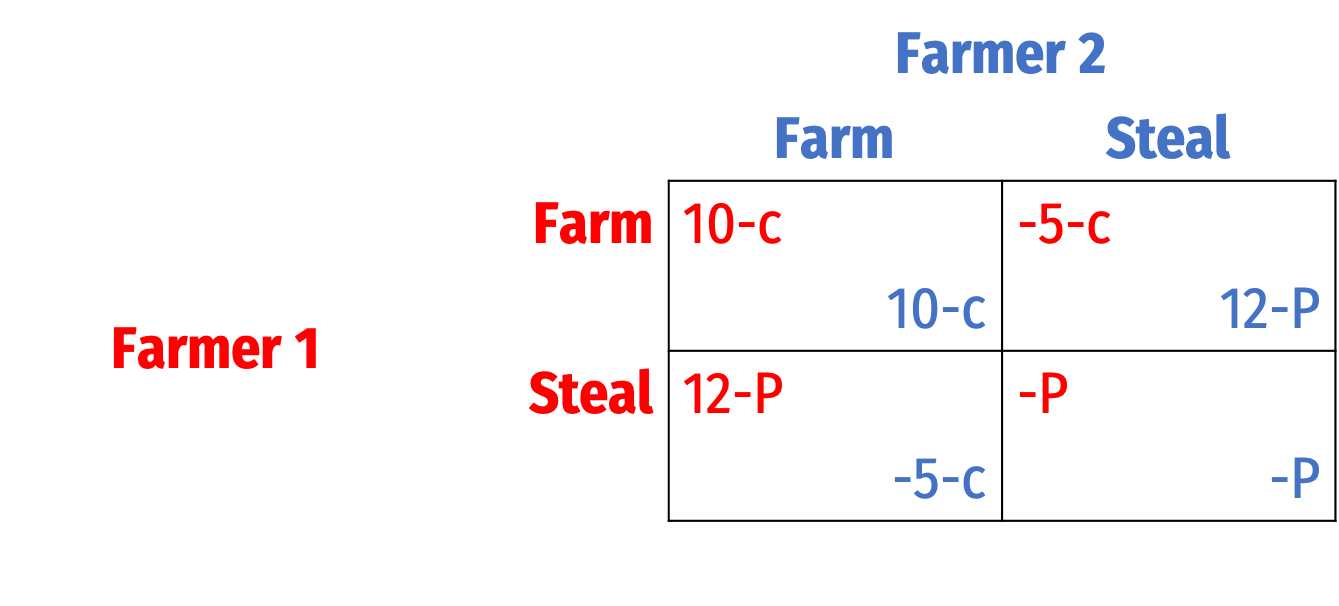
Rent-Seeking
Rent-seeking: a party investing resources to transfer wealth from other parties to themselves (or investing resources to prevent transfer of their wealth to others)
Grew out of literature on lobbying and government favors
- a much more general problem, even if no government exists to hand out favors!
Economic rent: a return above an asset's opportunity cost

Rent-Seeking

Gordon Tullock
1922-2014
“Transfers themselves cost society nothing, but for the people engaging in them they are just like any other activity, and this means that large resources may be invested in attempting to make or prevent transfers. These largely offsetting commitments of resources are totally wasted from the standpoint of society as a whole,” (p.230).
Tullock, Gordon, (1967), "The Welfare Cost of Tariffs, Monopolies, and Theft," Western Economic Journal 5(3): 224-232.
Rent-Seeking

Gordon Tullock
1922-2014
“The total social cost of theft is the sum of the efforts invested in the activity of theft, private protection against theft, and the public investment in police protection. The theft itself is a pure transfer, and has no welfare cost, but the existence of theft as a potential activity results in very substantial diversion of resources to fields where they essentially offset each other,and produce no positive product. The problem with income transfers is not that they directly inflict welfare losses, but that they lead people to employ resources in attempting to obtain or prevent such transfers. A successful bank robbery will inspire potential thieves to greater efforts, lead to, the installation of improved protective equipment in other banks, and perhaps result in the hiring of additional policemen. These are its social costs, and they can be very sizable,” (p.231)
Tullock, Gordon, (1967), "The Welfare Cost of Tariffs, Monopolies, and Theft," Western Economic Journal 5(3): 224-232.
Conflict is Costly

Gordon Tullock
1922-2014
“[Conflicts] lead to investment of resources by A to get B’s property and by B to defend it. Regardless of the outcome of the conflict, the use of resources for this purpose is offsetting and therefore inherently wasteful.”
“Social contrivances for reducing such [rent-seeking] investment are, on the whole, desirable, although there may be cases where it is more efficient to place no institutional restrictions on such conflict,” (p. 5).
Tullock, Gordon, (1975), The Social Dilemma
Government Exists to Protect Property Rights

John Locke
1632-1704
"Why will he part with his freedom? ... Though in the state of nature he hath such a right, yet the enjoyment of it is very uncertain, and constantly exposed to the invasion of others...the enjoyment of the property he has in this state is very unsafe very unsecure...[He] is willing to join in society with others...for the mutual preservation of their lives, liberties, and estates, which I call by the general name, property." (Ch. IX).
"The great and chief end, therefore, of men's uniting into commonwealths, and putting themselves under government, is the preservation of their property." (Ch. IX).
Locke, John, 1689, Second Treatise on Government